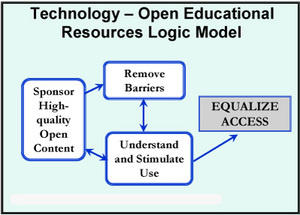
From the Hewlett Foundation's Open Educational Resources – Making High Quality Educational Content and Tools Freely Available on the Web
In March I reported on the Open University's announcement that it would be making some of its content "open", supported by a large grant from the William and Flora Hewlett Foundation. In July I included a summary from a presentation I attended by Jason Cole and Martin Dougiamas about the OU's use of Moodle. Since then progress has been swift and impressive.
On 25/10/2006, the OU launched OpenLearn "free and open educational resources for learners and educators around the world". [Hewlett Foundation media release.] Yesterday I heard a presentation to the HEFCE "eLearning Partnership Board" (on which I represent ALT) by Professor David Vincent, who is the OU pro Vice Chanceller responsible for the initiative.
The goals of OpenLearn are:
"to make some of The Open University’s distance learning materials freely accessible in an international web-based open content environment and, in so doing, to advance open content delivery method technologies by:
- deploying leading-edge learning management tools for learner support;
- encouraging the creation of non-formal collaborative learning communities;
- enhancing international research-based knowledge about modern pedagogies for higher education."
Unlike MIT's OpenCourseWare, the OU is publishing complete chunks of structured curriculum, between 3 and 20 hours in duration (thus "MIT with pedagogy"). In contrast, whereas MIT's OpenCourseWare aims to publish learning materials for virtually all of MIT courses, OpenLearn when the current grant runs out in 2008 will cover 5% of the OU's courses - around 8000 hours of learning content (thus "MIT without completeness").
A good way to find out about the general "ins" and "outs" of OpenLearn is from its FAQ page. Three important and interesting aspects of OpenLearn are firstly that 12% of the Hewlett grant is tied to systematic evaluation of the initiative, and secondly that alongside OpenLearn is LabSpace, where users can:
- share and reuse educational resources;
- download some of them;
- amend, translate them, or otherwise alter them;
- upload them for others to benefit.
Thirdly, although users of OpenLearn get no human tutorial or assessment support, the system uses Moodle to provide tools for the creation on informal "online learning communities", enhanced by a range of collaborative tools, such as FlashMeeting, developed by the OU's Knowledge Media Institute.
Does the OU know where OpenLearn is taking it? The short answer is "no", and there are many questions that this large scale and highly structured action research project will answer over the next couple of years. For example:
- who will use OpenLearn, and how will they find it? (As an aside, currently, some of the core content does not seem to be being indexed by Google, which might be intentional, or a result of the OpenLearn having only been recently launched.)
- will extensive and effective curriculum development take place in the LabSpace? (What would be very interesting would be to try to create "complete chunks of structured curriculum" in LabSpace, using content from MIT.)
- will OpenLearn draw people into signing up for priced, tutored, and assessed OU courses?
- what use will learners make of facilities provided by OpenLearn for online communities?
- is there a business model under which the OU could carry on developing OpenLearn for a wider range of courses, without grant-aid?
- how will OpenLearn fit in against other Open Content initiatives, for example Wikiversity, if and when content begins to build up in them?
Moving away from the OU itself, what impact will OpenLearn have on the competition? For example, will Ufi/learndirect lose paying customers to OpenLearn? Compare, for example, the learndirect business processes and skills courses with business and management titles offered by the OU. And above all, will the OU's high profile and active engagement with Open Content and Open Source, encourage the UK Government, in particular the Department for Education and Skills, to start taking fuller account of both in its long term policy thinking?
Ref. the comments about Google indexing, this discussion from Moodle.org may provide part of the answer http://moodle.org/mod/forum/discuss.php?d=57161
Ray
Posted by: Ray Lawrence | 30/10/2006 at 13:19